Final report for NEDC18-001
Project Information
Recognizing the need, challenges and encouraging trends in urban agriculture, UDC has instituted a Farmer Training Program to lease quarter- to half-acre training plots to beginning and experienced farmers, and to train them in sustainable farming practices. In order to increase the resilience of urban farmers, the Center for Urban Agriculture and Gardening Education (CUAGE) conducted training workshops in sustainable agriculture by linking a group of carefully selected aspiring and existing urban farmers (6 farmers and 2 service providers) from metropolitan Washington with quarter- to half-acre plots of farmable land at UDC’s Firebird Farm Agricultural Experiment Station (AES). CUAGE provided trainees with land, irrigation, small equipment and hand tools, deer protection and training by farm staff with professional expertise. Selected farmers were trained to grow a vegetable crop of their choice (for example, tomato, eggplant, pepper, sweet potato, lamb’s quarters and Malabar spinach) in the space set aside for these agripreneurs (agricultural entrepreneurs).
This SARE state project supported the Farmer Training Program by conducting a comprehensive suite of 8 training workshops in the first year and 2 online workshops in the second year (due to COVID-19). Two service providers and six farmers attended the trainings. During the first year, one service provider established his plot and planted it with peppers, garden eggs, Malabar spinach, spearmint, chocolate mint, and kale within two weeks of the completion of the soil improvement work. This enabled other participants in learning bed preparation and plot establishment techniques from him. By the end of this project, two service provider participants were issued a course completion certificate in "The Urban Agriculture Technician Certificate Course" offered by the project team to train participants in equipment use, propagation, soil preparation, pest management, produce safety and irrigation installation.
Service providers trained through this project were unable to support farmers in production on the half acre plots reserved for them due to COVID-19 restricting our in-person work. However, several valuable service provider outcomes occurred that will have great benefit to farmer trainees at UDC’s CUAGE in the future: 1) In lieu of in-person workshops and demonstrations, Brian Barnes (Project assistant, Firebird Farm) developed a 2 part online course to train participants in equipment use, propagation, soil preparation, pest management, produce safety and irrigation installation. After completing the course, participants received a course completion certificate as a marketable workforce credentials titled “The Urban Agriculture Technician Certificate Course”. The online content will be available to beneficiaries indefinitely. 2) In September 2020, 2 service provider participants and UDC staff member installed an irrigation system for the farm and shared a video recording with farmer participants. The service provider laid plastic mulch and drip tape on one plot, and hooked it up to a cistern with irrigation pump. Due to COVID 19, only one of our 6 farmer beneficiaries was able to participate in the irrigation system training. He demonstrated a thorough understanding of how to use the system by independently using it to irrigate the plot on two occasions. He also demonstrated an understanding of how to install drip irrigation to his plot.
These service providers not only provides an opportunity for the university to fulfill its land-grant mission pertaining to cooperative extension, but also sets up incidences of knowledge exchange between the university’s staff and D.C.’s burgeoning urban farming communities.
8 farmers/growers including 2 who also serve as agricultural service providers who participate in this project will use recommended sustainable crop production practices learned through the project to produce, for example, about 42 to 85 tons of marketable tomato crop on about 2.5 to 5 acres of land at the UDC Firebird Research Farm/Agricultural Experiment Station. The aim is to help the farmer grow a crop of his/her choice, although we would recommend a list of crops including tomato.
The 2 agricultural service providers who participate in this project will teach/advise at least 10 farmers/growers about concepts and recommended sustainable crop production practices learned through the project.
The goal of the proposed project was the alignment of Northeast SARE’s mission of outcome-focused professional development (PD) projects on needs- and interest-based topics with the University of District of Columbia (UDC) focus on Urban Agriculture and Urban Sustainability to improve the quality of life and economic opportunity of people and communities in the District of Columbia. The project aimed to address the NIFA programs of improving food security and mitigating climate change, and the local government's "Sustainable DC" goals of increasing green-economy jobs and small businesses and bringing locally-grown food within a quarter mile of 75% of DC residents.
This project proactively addressed the critical need and opportunity to 1) boost farming in the region, 2) promote and capture the growing interest in urban farming and consumer interest in locally produced food and 3) build resilience of both beginning and existing farmers by providing access to land and training in sustainable production management practices, marketing and food safety.
Educational Approach
Education Plan
- Recruitment and Pre-Training Engagement - Participants were recruited through existing contacts in the community and through volunteers who have worked with us previously, after carefully screening them for best fit for the program, for example, commercial farmers with small land holdings. UDC provided growing space where participants can practice and execute what they learn in course modules. Two of the participants engaged were growers who also serve in the capacity of agricultural service provider and advisor to the other growers, to implement the “train the trainer” objective.
Aspiring participants applied using an application/questionnaire that is designed to extract information on relevant farming experience and personal goals, including their marketing plan, objectives and potential customers.
- Learning Objectives – Beginning with the application, participants were provoked to think about their goals, customers, market potential for their produce and their preferred method of marketing it.
Through a series of 8 workshops, 8 urban growers including the 2 who also serve as agricultural service providers were encouraged and motivated to adopt good agricultural practices on their farms. They learned 1) about sustainable agriculture including integrated pest management, 2) to grow and sell nutrient-dense, marketable produce in D.C. communities, 3) to successfully adopt food safety practices and 4) to close the system loop through compost management on the farm.
Milestones
6 urban farmers/growers and 2 service providers out of 15 people who respond to recruitment announcements will: be accepted into the program; affirm commitment to the program participation and learning goals; and complete a questionnaire about their relevant farming experience and personal goals, including their marketing plan, objectives and potential customers. (1-May-2019)
6
2
6
2
May 01, 2019
Completed
April 15, 2019
Call for applications was released in early March, 2019. Forty applications were received by closing date of 03/15/2019. Six new/beginning farmers were shortlisted based on their personal goals and business/marketing plans. Two farmers were selected as agricultural service providers based on their prior experience in and knowledge of sustainable farming. All 8 were then interviewed in-person or by phone to assess their commitment to the program before final selection. The final group included women, immigrants and long-term residents.
6 urban farmers/growers and 2 agricultural service providers will attend the first 4 half day workshops and learn about the following:
Workshop 1: 1) equipment safety, operation and maintenance, and be able to 2) state the essential nutrients and pH conditions needed for optimal soil fertility, 3) collect a soil sample and interpret the results for application of soil nutrients, 4) gain experience in seedling propagation and 5) prepare a soil seedbed for planting. (May 2019)
Workshop 2: 1) direct seeding and transplanting, 2) thinning and weeding, 3) trellising and pruning, 4) irrigation and water conservation, 5) mulching and soil run-off, and 6) water resource management. (June 2019)
Workshop 3: 1) pollination, 2) integrated pest management and pesticide safety, 3) controlling deer, rabbits and groundhogs, and 4) effective disease management. (June-July 2019)
Workshop 4: 1) good land management with 2) cover cropping, 3) species diversity, and 4) composting. (July 2019)
6
2
6
2
July 31, 2019
Completed
August 03, 2019
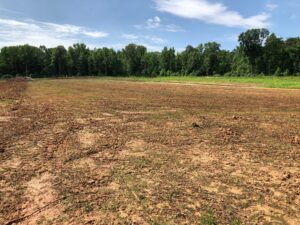

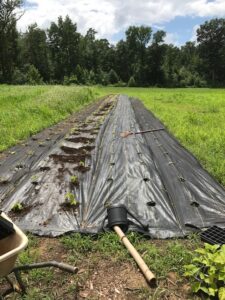
Work on improving the soil conditions in the new field began in May by our contractors, Purple Mountain Organics. The ground was leveled and compost was spread on the field. Native grass was established in the main water-way to reduce erosion and runoff. A cover crop of native grass and buckwheat was also planted and established itself well. Due to wet conditions delaying work, the field was ready for planting only by July 1, 2019.
Participants attended 4 half-day workshops every Saturday between July 13 to August 3, 2019 to learn about various aspects of farming. They were also able to watch and learn from service providers who demonstrated many of the techniques including equipment handling and bed preparation. One service provider established his plot and planted it with peppers, garden eggs, malabar spinach, spearmint, chocolate mint, and kale within 2 weeks of the completion of the soil improvement work. This enabled other participants in learning bed preparation and plot establishment techniques from him.
6 urban farmers/growers and 2 agricultural service providers will attend the fifth half day workshop which will focus on a presentation on SARE activities and programs. Attendees for this workshop may also include participants in other ongoing outreach activities at UDC. (July 2019)
6
2
6
2
July 31, 2019
Completed
June 27, 2019
Even though the presentation on SARE activities and programs was proposed to be conducted mid-program, we decided to actually begin the program with this workshop. Only 2 farmers were able to attend in person as it was held on a week day in conjunction with another event. Others were able to watch a video recording. Handouts provided by SARE were made freely available to all farmers.
Participants showed interest in SARE activities and programs, and contacted the coordinator for information throughout the duration of the program.
6 urban farmers/growers and 2 agricultural service providers will attend the sixth workshop, which will be a 16 hour workshop focusing on 1) clean harvesting techniques, 2) value addition, 3) proper storage, and 4) safe and sanitary handling of food. The workshop will be coordinated with UDC’s Center for Nutrition, Diet and Health (CNDH) to teach a practically focused food safety course. Participants will learn about D.C. food and personnel safety regulations, proper food preparation and storage methods, effective cooking and storage temperatures, sources of food contamination, etc. They will receive an accredited certificate at the end of the course which will enable them to build their workforce credentials. The aim of this workshop is to educate trainees in safety standards if they want to start their own food business/restaurant or want to supply produce to the multitude of restaurants in the Washington Metropolitan Area. Participants may take their certificate, which is good for five years, to their local Health Department to receive certification for their state. The District of Columbia certification is valid for three years. (July - September 2019)
6
2
6
1
September 30, 2019
Completed
September 13, 2019
The sixth workshop on harvest and produce safety was hosted virtually via video recording. Due to the field dedicated to the program needing substantial amendment and irrigation supply, and due to severe weather conditions, the program faced delays and constraints which restricted the project operation to only 2.5 months between July and September. Some of the participants had already taken the food safety course offered by UDC’s Center for Nutrition, Diet and Health (CNDH) prior to implementation of the program, and others were unable to take it due to shortage of time though there was interest.
6 urban farmers/growers and 2 agricultural service providers will attend the seventh and eight half day workshops where they will learn about the following:
Workshop 7: 1) how to transport produce, 2) the importance of identifying potential customers and doing a market analysis, and 3) developing a sustainable urban agriculture business plan to market their produce. This workshop will be coordinated with staff at UDC’s Center for Sustainable Development and Resilience (CSDR). (September 2019)
Workshop 8: the benefits of cover crops and organic fertilizers by conducting soil analysis at the conclusion of program for comparative analysis with bare earth fallow. (August 2019)
6
1
September 30, 2019
Completed
October 12, 2019
The 7th workshop on business planning and marketing was canceled due to the concerned staff at CSDR leaving UDC. As an alternative, project team identified an agricultural marketing conference/workshop in Maryland that participants could attend using program funds. However, participants were unable to utilize the opportunity.
As part of the 8th workshop, the cover crop of buckwheat and native grass planted in the plots was mowed in September, 2019 and planted with a cover crop of oats and peas in October, 2019.
The 6 urban farmer/grower and 2 service provider participants will receive ongoing support from the project team via meetings, consultations and additional presentations, as needed. They also receive data sheets and templates of checklists for recording information about their project activities
6
2
6
2
September 30, 2019
Completed
October 12, 2019
All farmers and service providers received continuous support from the project team via meetings, consultations and additional presentations, as needed. They were also given information on SARE programs and funding opportunities when approached, in addition to the half day workshop on the same. Project team continued to give information on other funding opportunities and useful workshops throughout and beyond the program.
Learning outcomes for the 6 urban farmer/grower and 2 service provider participants will be verified throughout the year using pre- and post-tests for each educational module, through interviews conducted by key individuals, review of record-keeping sheets, and through observation of demonstrated skills. (Sep 2019)
6
2
6
2
September 30, 2019
Completed
October 31, 2019
Learning outcomes were verified using pre- and post-tests for one educational module related to cover cropping. While attendance was limited in each workshop, there was participation and a documented increase in knowledge by those who attended. This was evident in project team's interactions with farmers and service providers. Due to not having a cistern and pump, water had to be brought to plots on an as-needed basis. Though irrigation supplies were ordered using program funds, most of the material needed for the completion of an irrigation cistern and gasoline powered pump arrived only after October 2019. Work is expected to be completed by May 2020, and will enable participants to have a drip irrigation hookup. Recognizing these constraints, regular emails and phone calls were made to participants to boost their confidence and motivate them to not only plant in their plots, but also to attend workshops conducted by project team and/or offered by the University of Maryland. In November 2019, one of the service providers established a crop of winter rye which will over-winter and be ready for harvest next year, in preparation for year 2 program.
Follow-up actions of grower participants will be verified through observations of demonstrated skills and abilities to perform tasks with fewer external prompts, and with questions regarding changes in markets, sales, income and diets as a result of participating in the project. Ag service provider participants will also be interviewed about their actions performed to extend knowledge learned to other growers. (Sep 2019)
6
2
6
2
September 30, 2019
Completed
October 31, 2019
Observations by the project team revealed that grower participants were not fully prepared to put their learned skills to test in the field due to the constraints mentioned above (short project duration, severe weather, virgin land and lack of irrigation). Except for ag service providers, none of the 6 farmers were ready/willing to plant anything in their plots. Ag service providers, who are experienced farmers, were interviewed and encouraged to extend their knowledge and motivate other grower participants. As this is the first such program conducted by the project team, we are confident that the foundation laid and the lessons learned in year 1 will help us immensely in delivering the program successfully in year 2. However, based on observations, and conversations regarding funding opportunities and future plans, it was evident that the beginning farmer participants were gaining knowledge and confidence.
The 6 urban farmers/growers and 2 service providers who participated in the Year 1 training program will respond to survey or interview requests and report on their plans for action (growing and/or assisting growers) for the upcoming season. (February 2020)
6
2
4
2
February 29, 2020
Completed
March 16, 2020
The 6 urban farmers/growers and 2 service providers who participated in the Year 1 training program responded to interview requests and reported on their plans for action (growing and/or assisting growers) for the upcoming season. Four farmers and 2 service providers showed strong interest in returning to the farm to practice what they had learnt in the previous year through workshops and demonstrations, and grow crops in the plots originally allotted to them. Some of them contacted us as early as January 2020 to express their interest.
The same training program will be continued in Year 2 with 6 commercial growers and 2 agricultural service providers (some are from year 1).
6 urban farmers/growers and 2 service providers out of 15 people who respond to recruitment announcements will: be accepted into the program; affirm commitment to the program participation and learning goals; and complete a questionnaire about their relevant farming experience and personal goals, including their marketing plan, objectives and potential customers. (April 2020)
6
2
4
2
April 30, 2020
Completed
June 15, 2020
Due to the strong interest expressed by beneficiaries from the previous year and because there were already strong indications of COVID-19 restrictions, we decided to retain the same farmers from year 1. Though this milestone was to be completed at the end of April, there was a delay of 1.5 months due to COVID-19 related uncertainties.
6 urban farmers/growers and 2 agricultural service providers will attend the first 4 half day workshops and learn about the following:
Workshop 1: 1) equipment safety, operation and maintenance, and be able to 2) state the essential nutrients and pH conditions needed for optimal soil fertility, 3) collect a soil sample and interpret the results for application of soil nutrients, 4) gain experience in seedling propagation and 5) prepare a soil seedbed for planting. (May 2020)
Workshop 2: 1) direct seeding and transplanting, 2) thinning and weeding, 3) trellising and pruning, 4) irrigation and water conservation, 5) mulching and soil run-off, and 6) water resource management. (June 2020)
Workshop 3: 1) pollination, 2) integrated pest management and pesticide safety, 3) controlling deer, rabbits and groundhogs, and 4) effective disease management. (June-July 2020)
Workshop 4: 1) good land management with 2) cover cropping, 3) species diversity, and 4) composting. (July 2020)
6
2
4
July 31, 2020
Completed
September 01, 2020
In lieu of in-person workshops and demonstrations, Brian Barnes (Project assistant, Firebird Farm) developed a 2 part online course to train participants in equipment use, propagation, soil preparation, pest management, produce safety and irrigation installation. After completing the course, participants received a course completion certificate as a marketable workforce credential. Pre- and post-tests were administered to gauge knowledge gain. The course, titled "The Urban Agriculture Technician Certificate Course", was published on June 1st, 2020. Out of the 4 farmer participants, 2 completed the course and received the certificate. The online content will be available to beneficiaries indefinitely. The course was open to general public.
6 urban farmers/growers and 2 agricultural service providers will attend the fifth half day workshop which will focus on a presentation on SARE activities and programs. Attendees for this workshop may also include participants in other ongoing outreach activities at UDC. (July 2020)
6
2
4
July 31, 2020
Completed
September 01, 2020
SARE activities and programs were discussed on line with 4 program participants. We distributed SARE publications to 2 farmer beneficiaries who were able to visit the farm in-person to discuss crop planning activities. The publications are expected to help them gain a better understanding of crop rotation, cover cropping, soil health and business development. 5 books included Building Soils for Better Crops, Crop Rotations on Organic Farms, Managing Cover Crops Profitably, Managing Insects on Your Farm, and Building a Sustainable Business.
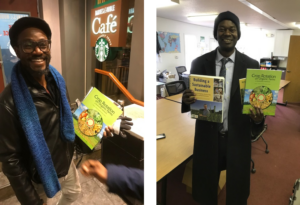
6 urban farmers/growers and 2 agricultural service providers will attend the sixth workshop, which will be a 16 hour workshop focusing on 1) clean harvesting techniques, 2) value addition, 3) proper storage, and 4) safe and sanitary handling of food. The workshop will be coordinated with UDC’s Center for Nutrition, Diet and Health (CNDH) to teach a practically focused food safety course. Participants will learn about D.C. food and personnel safety regulations, proper food preparation and storage methods, effective cooking and storage temperatures, sources of food contamination, etc. They will receive an accredited certificate at the end of the course which will enable them to build their workforce credentials. The aim of this workshop is to educate trainees in safety standards if they want to start their own food business/restaurant or want to supply produce to the multitude of restaurants in the Washington Metropolitan Area. Participants may take their certificate, which is good for five years, to their local Health Department to receive certification for their state. The District of Columbia certification is valid for three years. (July - September 2020)
6
2
4
September 30, 2020
Completed
September 01, 2020
Information on clean harvesting techniques, value addition and proper storage was provided during the certificate course mentioned in milestone 3. However, due to COVID-19, CNDH was unable to offer the food safety workshop as it entails a nationally administered test.
6 urban farmers/growers and 2 agricultural service providers will attend the seventh and eight half day workshops where they will learn about the following:
Workshop 7: 1) how to transport produce, 2) the importance of identifying potential customers and doing a market analysis, and 3) developing a sustainable urban agriculture business plan to market their produce. This workshop will be coordinated with staff at UDC’s Center for Sustainable Development and Resilience (CSDR). (September 2020)
Workshop 8: the benefits of cover crops and organic fertilizers by conducting soil analysis at the conclusion of program for comparative analysis with bare earth fallow. (August 2020)
6
2
5
2
September 30, 2020
Completed
September 30, 2020
Due to COVID-19, we were unable to hold/continue any in-person activities. Participants were restricted from entering the farm in accordance with DC government and UDC guidelines. In order to make best use of program funds, a decision was taken to enroll participants in an online webinar series designed for aspiring/beginner small farmers. The course is offered by Cornell University's College of Agriculture and Life Sciences (CALS) through the Cornell Small Farms Program. 7 farmer participants showed strong interest in taking the course and were registered in August 2020, along with a program advisor. Webinars were conducted in September 2020 and registered participants have lifelong access course material. Farmer participants were most interested in the following courses: Starting at Square One; Soil Health; Exploring Markets and Profits; Social Media & Online Marketing; Holistic Financial Planning and Season Extension with High Tunnels.
The 6 urban farmer/growers and 2 agricultural service providers will receive travel support to participate in one or two nearby sustainable agriculture conferences or workshops to build upon knowledge learned through the project workshops. (September 2020)
6
2
5
2
September 30, 2020
Completed
September 30, 2020
Due to COVID-19 related restrictions, no travel was allowed and all conferences/workshops were canceled. Furthermore, we were unable to identify any online conferences/workshops. To make best use of program funds, participants were enrolled in the online course offered by Cornell University's College of Agriculture and Life Sciences (CALS) through the Cornell Small Farms Program. 7 farmer participants showed strong interest in taking the course and were registered in August 2020. Webinars were conducted in September 2020 and registered participants have lifelong access to course material (see Milestone 6).
The 6 urban farmer/grower and 2 service provider participants will receive ongoing support from the project team via meetings, consultations and additional presentations, as needed. They also receive data sheets and templates of checklists for recording information about their project activities. (Sep 2020)
6
2
5
2
September 30, 2020
Completed
September 30, 2020
All farmers and service providers received continuous support from the project team via phone calls and consultations as needed. They were also given information on SARE programs and funding opportunities. Project team has made urban agriculture certificate course content available to participants indefinitely beyond the project end date. In addition, the team has enabled participation in an online course conducted by Cornell University in September 2020, and ensured that farmer beneficiaries have lifelong access to useful information.
Learning outcomes for the 6 urban farmer/grower and 2 service provider participants will be verified throughout the year using pre- and post-tests for each educational module, through interviews conducted by key individuals, review of record-keeping sheets, and through observation of demonstrated skills. (Sep 2020)
6
2
1
2
September 30, 2020
Completed
September 01, 2020
Learning outcomes were verified using pre- and post-tests for the urban agriculture technician certificate course. Active participation and increase in knowledge were documented and evident in project team’s interactions with farmers and service providers. In year 1, due to not having a cistern and pump, water had to be brought to plots on an as-needed basis. Irrigation supplies were ordered using program funds to have the system up and running for year 2. In September 2020, UDC farm staff installed the system (see pictures below) and shared a video recording with farmer participants. The contractor/service provider laid plastic mulch and drip tape on one plot, and hooked it up to the cistern. Installation of the cistern pad, cistern and irrigation pump was successful and was conducted by 2 service providers. Due to COVID 19, only one of our 6 farmer beneficiaries was able to participate in the irrigation system training. He demonstrated a thorough understanding of how to use the system by independently using it to irrigate the plot on two occasions. He also demonstrated an understanding of how to install drip irrigation to his plot. Recognizing COVID-19 constraints and restrictions, regular emails and phone calls were made to participants to boost their confidence and motivate them to attend workshops conducted by project team and offered by Cornell University. Though participants were disappointed that they were unable to grow anything in their plots and test the good agriculture practices they learnt in our workshops, they were very appreciative that we enabled workforce development through online certificate courses.

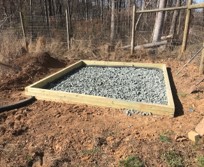
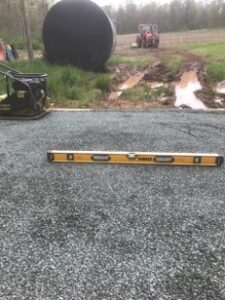
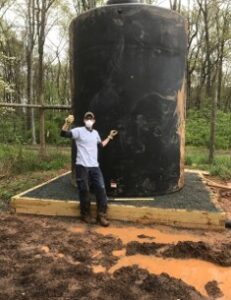
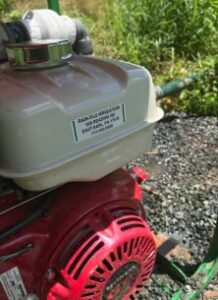
Follow-up actions of Year 1 and Year 2 program grower participants will be verified through observations of demonstrated skills and abilities to perform tasks with fewer external prompts, and with questions regarding changes in production, markets, sales, income and diets as a result of participating in the project. Ag service provider participants will also be interviewed about their actions performed to extend knowledge learned to other growers. (Sep 2020)
6
2
4
September 30, 2020
Completed
September 30, 2020
Grower participants were unable to put their learned skills to test in the field due to COVID-19 constraints and restrictions. Even though the project team contracted a person (who is also a service provider) to amend the soil and keep plots ready for farmer participants, they were unable to work their plots as entry to the farm was restricted as COVID-19 intensified. Despite the drawbacks we faced in year 1 and year 2, we are confident that the foundation laid and the lessons learned will help us immensely in delivering similar programs successfully in the future. Most importantly, based on observations and conversations regarding funding opportunities and future plans, it was evident that the beginning farmer participants were gaining knowledge and confidence. The project team’s efforts to provide online courses in lieu of planned in-person activities bolstered participants’ trust and interest in participating in future programs and activities.
Milestone Activities and Participation Summary
2. In order to make best use of program funds, a decision was taken to enroll participants in an online webinar series designed for aspiring/beginner small farmers. The course is offered by Cornell University’s College of Agriculture and Life Sciences (CALS) through the Cornell Small Farms Program. 7 farmer participants showed strong interest in taking the course and were registered in August 2020, along with a program advisor. Webinars were conducted in September 2020 and registered participants have lifelong access course material. Farmer participants were most interested in the following courses: Starting at Square One; Soil Health; Exploring Markets and Profits; Social Media & Online Marketing; Holistic Financial Planning and Season Extension with High Tunnels.
Participation Summary:
Learning Outcomes
2 participants were issued course completion certificate in "The Urban Agriculture Technician Certificate Course" to train participants in equipment use, propagation, soil preparation, pest management, produce safety and irrigation installation. Knowledge gained was gauged through pre- and post tests.
Performance Target Outcomes
Performance Target Outcomes - Service Providers
Target #1
The 2 agricultural service providers who participate in this project will teach/advise at least 10 farmers/growers about concepts and recommended sustainable crop production practices learned through the project. We will continue to maintain strong ties with the 2 agricultural service providers, communicate regularly with them and facilitate events on the farm where they can teach sustainable crop production practices learned through the project (to farmers/growers separate from lease holders). The outcome will be measured by establishing contact with the 10 individuals to discuss what they learned, whether they plan to implement the sustainable farming practices on their farm, and to offer our support for the same. They will also be invited to visit the training plots on Firebird Farm to encourage them further in implementing the practices.
2.5 acres
| Year 1 | Year 2 | Year 3 |
|---|---|---|
| 2 | 2 | 0 |
Field demonstrations on preparing land and individual plots, cover cropping, setting up irrigation system.
| Year 1 | Year 2 | Year 3 |
|---|---|---|
| 6 | 2 | 0 |
| Year 1 | Year 2 | Year 3 |
|---|---|---|
Each farmer was allowed to work on 0.5 acres of Firebird Farm land. Our project enlisted beginning and immigrant farmers who do not own land of their own. |
Each farmer was allowed to work on 0.5 acres of Firebird Farm land. Our project enlisted beginning and immigrant farmers who do not own land of their own. |
| Activity | Year 1 | Year 2 | Year 3 | Total |
|---|---|---|---|---|
| Consultations | 1 | 1 | 0 | 2 |
| On-farm demonstrations | 2 | 1 | 0 | 3 |
Milestone2: Verification was done in-person by staff who also participated in these events, including the University of Maryland workshop.
Participants attended 4 half-day workshops every Saturday between July 13 to August 3, 2019 to learn about various aspects of farming. They were also able to watch and learn from service providers who demonstrated many of the techniques including equipment handling and bed preparation. One service provider established his plot and planted it with peppers, garden eggs, malabar spinach, spearmint, chocolate mint, and kale within 2 weeks of the completion of the soil improvement work. This enabled other participants in learning bed preparation and plot establishment techniques from him. Participants learned the benefits of cover cropping and visited cover-cropped plots on the farm. Useful workshops offered by the University of Maryland Extension were identified and participants were encouraged to attend. One participant attended the private applicator pesticide certification course offered by the University of Maryland.
Milestone 11: Pre- and post-tests were administered to gauge knowledge gain in the course, titled “The Urban Agriculture Technician Certificate Course” (June-September, 2020). Out of the 4 farmer participants, 2 completed the course and received the certificate.
Performance Target Outcomes - Farmers
Target #1
8
8 farmers/growers including 2 who also serve as agricultural service providers who participate in this project will use recommended sustainable crop production practices learned through the project to produce, for example, about 42 to 85 tons of marketable tomato crop on about 2.5 to 5 acres of land at the UDC Firebird Research Farm/Agricultural Experiment Station. The aim is to help the farmer grow a crop of his/her choice, although we would recommend a list of crops including tomato.
1 acre
2
Mulching plots for water conservation and weed suppression.
Using drip irrigation to conserve water.
1 acre
Because our farmer participants are beginner and/or immigrant farmers, the university provided half-acre plot to each participant to grow vegetables of their choice by implementing the sustainable agriculture practices they learnt in the program. However, they were unable to grow crops on their plots due to weather impacts and delayed infrastructure development in the first year. In year 2, participants were restricted from entering the farm in accordance with DC government and university guidelines due to COVID-19. In order to make best use of program funds, we enrolled 7 participants in an online webinar series designed for aspiring/beginner small farmers offered through the Cornell Small Farms Program. The project team’s efforts to provide online courses in lieu of planned in-person activities bolstered participants’ trust and interest in participating in future programs and activities. Despite the drawbacks we faced in year 1 and year 2, we are confident that the foundation laid and the lessons learned will help us immensely in delivering similar programs successfully in the future. Most importantly, based on observations and conversations regarding funding opportunities and future plans, it was evident that the beginning farmer participants were gaining knowledge and confidence.
In year 1, two service providers demonstrated how to amend and mulch the plots including planting of several vegetable crops. One participant was able to practice the mulching and planting activities on the same demonstration plots. Due to not having a cistern and pump, water had to be brought to plots on an as-needed basis. Irrigation supplies were ordered using program funds to have the system up and running for year 2. In September 2020 (year 2), UDC farm staff installed the system and shared a video recording with farmer participants. Service providers laid plastic mulch and drip tape on one plot, and hooked it up to the cistern. They demonstrated the installation of the cistern pad, cistern and irrigation pump, which was recorded on video to release to farmers, as only one of our 6 farmer beneficiaries was able to participate in the training due to COVID-19 restrictions. This participant demonstrated a thorough understanding of how to use the system by independently using it to irrigate the plot on two occasions. He also demonstrated an understanding of how to install drip irrigation to his plot. Recognizing COVID-19 constraints and restrictions, regular emails and phone calls were made to participants to boost their confidence and motivate them to attend workshops conducted by project team and offered by Cornell University. Though participants were disappointed that they were unable to grow anything in their plots and test the good agriculture practices they learnt in our workshops, they were very appreciative that we enabled workforce development through online certificate courses.
Learning outcomes were verified using pre- and post-tests for the urban agriculture technician certificate course offered by a project team member. Active participation and increase in knowledge were documented and were evident when farmers interacted with service providers and project team members.
Additional Project Outcomes
| Year 1 | Year 2 | Year 3 | Total |
|---|---|---|---|
| 0 | 1 | 0 | 1 |
| Year 1 | Year 2 | Year 3 | Total |
|---|---|---|---|
| 0 | 1 | 0 | 1 |
| Year 1 | Year 2 | Year 3 | Total |
|---|---|---|---|
| $0 | $33320 | $0 | $33320 |
The proposal titled "Washington DC Urban Orchard Professional Development Program" was submitted to NESARE by Matthew Gardine, who was an advisor on the current project, and was awarded $33,320 for 2 years (SNE20-016-DC). The program is designed to extend fruit growing techniques to local Agricultural Service Providers (ASP) who will participate in a comprehensive suite of training workshops, seminars, and field practicums held at UDC’s Agricultural Experiment Station.
The second unanticipated outcome from the project is that Brian Barnes, a key individual involved in the project, was able to conduct a zoom session with Katie Campbell-Nelson (NESARE's Professional Development Program Coordinator) for an in-field pest scouting visit to identify harlequin bugs.
SARE Outreach
Milestone 3 included a half day workshop/ presentation on SARE activities and programs which generated interest among participants who contacted the coordinator for funding information throughout the duration of the program.
Additionally, two separate events were conducted - one focused on SARE activities and programs and the other partially supported by another NESARE grant:
- presentation on SARE activities and programs to 65 participants in the Agroecology Certificate Course offered at UDC by project coordinator in June and July, 2019.
- workshop on small-scale mushroom cultivation offered by a NESARE grantee was hosted by project coordinator at UDC to 86 participants in November, 2019.
In year 2:
In addition to the milestones achieved, two separate events were conducted - one focused on SARE activities and programs and the other partially supported by another NESARE grant:
- presentation on SARE activities and programs to 56 participants in the Home and Community Sustainable Food Production certificate course offered at UDC by project coordinator in summer 2020.
- Follow up on workshop on small-scale mushroom cultivation hosted in November 2019, as reported in year 1: Interestingly, the project coordinator has received inquiries by community members interested in a future certificate course in mushroom cultivation. Additionally, many who attended the mushroom cultivation course in November 2019 came back for other certificate courses offered on line in summer 2020.
Recieved information about SARE grant programs and information resouces:
| Audience | Year 1 | Year 2 | Year 3 | Total |
|---|---|---|---|---|
| Service providers | 2 | 2 | 0 | 4 |
| Farmers | 151 | 56 | 0 | 207 |